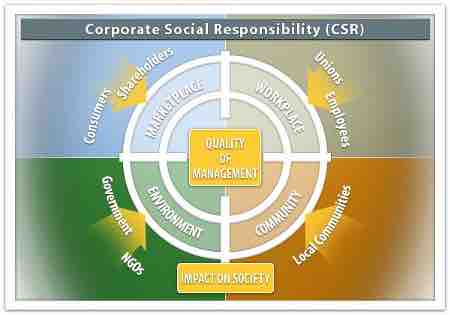The Social Environment of Business
Businesses do not operate in a vacuum. A firm's actions have repercussions that echo throughout society. Corporate social responsibility (CSR) is a form of corporate self-regulation integrated into a business model . CSR policy functions as a built-in, self-regulating mechanism whereby a business monitors and ensures its active compliance with the spirit of the law, ethical standards, and international norms. The goal of CSR is to embrace responsibility for the company's actions and encourage a positive impact through its activities on the environment, consumers, employees, communities, and all other members of the public sphere who may be considered stakeholders.

The topics surrounding CSR have become more complex due to globalization and the issues that arise from companies competing in international markets. Companies are manufacturing goods, hiring local labor, and utilizing raw materials and resources extracted from the environment in international locations. This heightened awareness of CSR and sustainable development has been endorsed by an increased responsiveness to ethical, social, environmental, and other global issues. In recent years, companies have been the center of scandals regarding accounting practices, damages to the environment, inadequate treatment of employees and workers, and the effect of products on society. This new global business environment is emerging from two accelerating shifts that are transforming how we use natural systems and material resources (materiality), and how we coordinate human action (sociality).
Materiality
Continuing industrial development has brought us into contact with the one planet limit on material supply. Thus, material resource scarcity is increasing, raising supply costs and shifting us away from the old economic growth strategy based in continually increasing resource consumption (more with more), to a new growth strategy based in increasing resource performance (more with less).
Sociality
Global adoption of digital communications and information technology (CIT) has converged media, communications, and information processing onto the Internet. Thus, CIT resource abundance is increasing, lowering communication costs and shifting us from the old coordination strategy based in hierarchical messaging (chain of command) to a new coordination strategy based in networked conversation (peer teaming). Hundreds of millions have embraced new social media tools such as Facebook and Twitter. As a result, a new social business environment has emerged around our organizations in a rising crescendo of change--transforming our whole conduct of life, bringing new risks, new rules, and vast new opportunities for economic growth.
Financial Case for CSR
The business case for CSR within a company will likely rest on one or more of these arguments:
- Human resources: A CSR program can aid recruitment and retention. Potential recruits often ask about a firm's CSR policy during an interview, and having a comprehensive policy can provide an advantage. CSR can also help improve the perception of a company among its staff, particularly when staff can become involved through payroll giving, fundraising activities, or community volunteering. CSR has been found to encourage customer orientation among frontline employees.
- Risk management: Managing risk is a central part of many corporate strategies. Reputations that take decades to build up can be ruined in hours through incidents such as corruption scandals or environmental accidents. These can also draw unwanted attention from regulators, courts, governments, and media. Building a genuine culture of "doing the right thing" within a corporation can offset these risks.
- Brand differentiation: In crowded marketplaces, companies strive for a unique selling proposition that can separate them from the competition in the minds of consumers. CSR can play a role in building customer loyalty based on distinctive ethical values.
- License to operate: Corporations are keen to avoid interference in their business through taxation or regulations. By taking substantive voluntary steps, they can persuade governments and the wider public that they are taking issues such as health and safety, diversity, or the environment seriously as good corporate citizens with respect to labor standards and impacts on the environment.